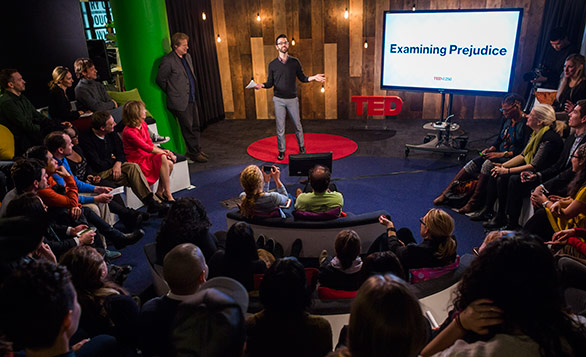
Jordan Reeves of TED-Ed hosted a session of talks in the TED office on prejudice. Photo: Ryan Lash
Last night in our office, we held a miniature TED session around the theme “Examining Prejudice.” And while it explored issues of discrimination and homophobia, it also veered to some unexpected places — like your dislike of Brussels sprouts.
“When we think of prejudice, we think of stupid people doing stupid things,” said psychologist Paul Bloom, the night’s first speaker. He aimed to show how prejudice actually stems from a rational place — the way the human mind parses in-group and out-group status. As he walked us through research on how strong this pull is, he hit upon the perfect example: In one study, babies not only showed a preference for puppets who appeared to like the same foods as they did — they actively punished the puppets who appeared to have different tastes.
Speaking of food, it was the next speaker — psychologist Betty Capaldi-Phillips — who talked about Brussels sprouts. She studies why we like some foods and have a deep aversion to others, and shared a simple trick for treaching yourself (or your baby) to like a new food. The simple answer is: Eat it, about 10 times. And if you can’t stand it at first, mix it with something you do like. That’s how researchers were able to train a preschool class to eat and like hated Brussels sprouts: serving them with cream cheese the first few times.
Journalist Misha Glenny has spent the past year working in Brazil, which will host TEDGlobal 2014. He asks us to put away our standard visions of samba, soccer and Copacabana beach. “Few places in the world are subject to such immutable prejudices as Brazil,” he says. He dug deeper, exploring why Brazil is a place of such startling economic inequality. It all has its roots, he says, in the “peculiar nature of Portuguese colonialism,” which included shocking numbers of slaves from all over Africa, a historical aversion to buildiing infrastructure, and the colonial habit of avoiding the interior and sticking to coastlines.
Educator Jamila Lyiscott delivered an incredible poem called “Broken English,” in which she showed that she is a “Trilingual orator” able to speak fluently at home, with Caribbean parents, at school in “proper English,” and with her friends in a language that is as formal and rules-based as the other two. The poem raised a big laugh when she pointed out, “You may think it is ignorant to speak Broken English, but even articulate Americans sound foolish to the British.”
And finally, Corey Johnson — New York City’s District 3 City Councilmember — told the story of coming out at age 16. It’s a story that won’t sound so distinct from others, except that he ended up on the front page of The New York Times because he also happened to be a hometown football star. Fifteen years later, he says, the decision to live an authentic life came down to just a few moments of clarity.
“Examining Prejudice” was part of TED@250, a series of salons held at our New York headquarters at 250 Hudson Street. Since our main conferences happen only twice a year, TED@250 is an opportunity for talks that rethink headlines and respond to conversation happening in real time. It’s also a place for speakers with the kind of personal stories that simply work better on the small scale.
Comments (4)
Pingback: Poet Argues She Speaks English in Three Different Ways - GalleyCat
Pingback: How the World Cup can make or break Brazil’s hopes for the future: Misha Glenny gives a talk on the country that’ll host TEDGlobal 2014 - The Online List
Pingback: How the World Cup can make or break Brazil’s hopes for the future: Misha Glenny gives a talk on the country that’ll host TEDGlobal 2014 | BizBox B2B Social Site
Pingback: How the World Cup can make or break Brazil’s hopes for the future: Misha Glenny gives a talk on the country that’ll host TEDGlobal 2014 - Rixal Communications | Custom Media & Advertising | Media. Solved. | Rixal.com